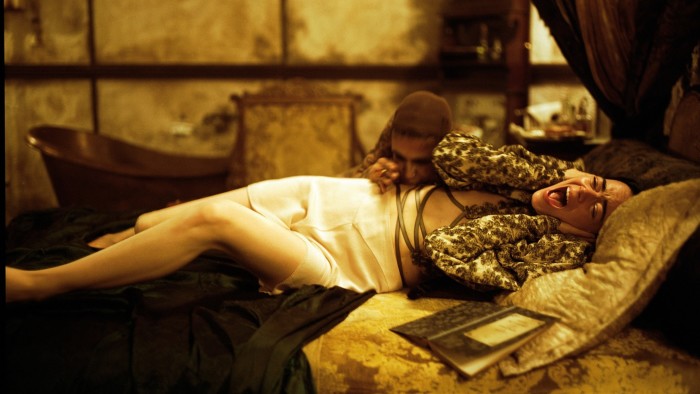Five stars for Yorgos Lanthimos’s Poor Things — Emma Stone burns up the screen

Roula Khalaf, Editor of the FT, selects her favourite stories in this weekly newsletter.
In 2018, Yorgos Lanthimos brought duck-racing, break-dancing and kinky sex games to the court of Queen Anne and the Venice Film Festival. Now he is back, reteaming with screenwriter Tony McNamara and star Emma Stone for the even more outlandish and wildly enjoyable Poor Things. Adapted freely from Alasdair Gray’s 1992 novel, it relocates events from Glasgow, plunging us into a deeply surreal version of Victorian London. The home of Dr Godwin Baxter has decor by Salvador Dalí and pets by Hieronymus Bosch — upholstered flooring, a bird with dog legs, a barking rooster. So intricately bizarre is the aesthetic, you expect to see Terry Gilliam peering jealously through the keyhole.
Stone is Bella Baxter, a naive woman-child who teeters around doll-like on her heels wearing a vacant expression, blurting out comic non-sequiturs and urinating where she pleases. Willem Dafoe is Godwin Baxter, her “God”, an experimental surgeon whose face is a patchwork fright-mask of badly botched suturing. As Bella’s creator of sorts, he is both Frankenstein and monster. He is also her de facto father figure, his schoolmasterly manner giving the dynamic Pygmalion overtones. Everything here, no matter how twisted, comes with a precise scientific justification. And so Godwin brings in the sweet-natured Max McCandles (Ramy Youssef) to keep meticulous notes on Bella’s progress, his critical distance soon giving way to infatuation.
Into this curious set-up Lanthimos injects a large helping of sex, Bella embracing the newly discovered delights of self-love with gusto — if an apple at the breakfast table is her first forbidden fruit, she quickly upgrades to a cucumber. This being Victorian Britain, the awakening of female sexuality quickly brings out two things in the men: fear and predation. All want in one way or another to control Bella. The film’s feminist subtext will eventually come strongly to the fore.
But first, in swoops Mark Ruffalo’s randy dandy Duncan Wedderburn, all pursed lips and twitching moustache. His ripely plummy tones and Dafoe’s ostensible Scottish burr both occasionally betray hints of Wisconsin. But such slips never stand out for long in a film full of grotesque distortions; master cinematographer Robbie Ryan, another Favourite alumnus, frequently breaks out the fish-eye lens while Jerskin Fendrix adds discordant notes and parping on the soundtrack.

As Bella and her new beau embark on a tour of Europe there is much “furious jumping” (expect equally furious debates about the amount of time Stone spends semi- or fully naked). But events take a darker turn, Bella’s understanding growing more sophisticated as the story becomes a picaresque travelogue. Watching Ruffalo unravel is one of the film’s great pleasures, but what really anchors it is the performance of burning intensity from Stone. It may well catch the eye of the Venice jury, led this year by her La La Land collaborator Damien Chazelle.
Poor Things is a full-scale assault on the ears and eyeballs with stellar work especially from art director Dániel Miklós, costume designer Holly Waddington and of course Lanthimos. No other mainstream director today is making movies this visually bold and brilliantly realised. Here he manages to pull off a riotously funny work that offers social commentary without hectoring and makes the impossible oddly believable. By the end, what seem strangest are the all-too-familiar ways of the world and especially the cruelty of possessive men — not so outlandish after all.
★★★★★
Festival continues to September 9, labiennale.org

Comments